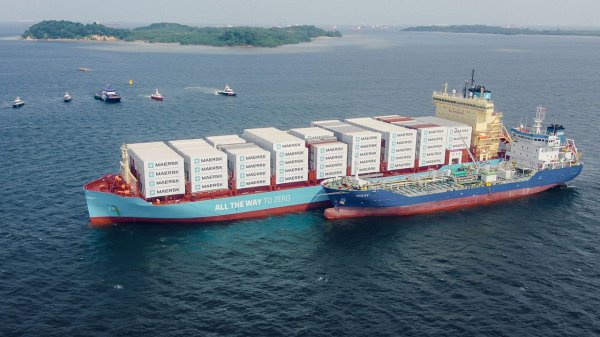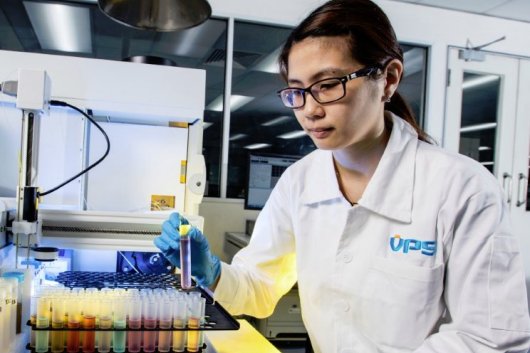Houston marine fuel contamination: VPS reveals exclusive findings
In-house test finds phenolic compounds in every sample taken from ships encountering problems.
By Veritas Petroleum Services (VPS)
On April 26, 2018, Veritas Petroleum Services (VPS) issued a Bunker Alert informing our clients of multiple vessels impacted by a sticking of fuel plungers, fuel-pump seizures and failures, when burning fuel oil bunkered in Houston, Texas.
At that time, it was known to be a widespread problem that was not limited to any particular supplier or barge, but more a potential upstream production, or refinery issue, with the 'true' cause unknown at that time.
Since the initial VPS Bunker Alert, this problem has grown to have affected at least 30 vessels in the VPS Fuel Analysis Programme, making it one of the most widespread fuel quality issues of recent years, with our statistics currently showing eight suppliers and 17 bunker tankers in the chain of supply.
Over the past four weeks, a VPS 'task-force' stationed across our laboratories have undertaken detailed forensic analysis of the many samples we have received from numerous vessels. It was critical that we were able to identify which components were common to all of the fuel samples and have the physical properties which could cause the problems experienced on board our clients' vessels.
The standard test methods within the ISO 8217 specification gave no clues to the underlying problem. Therefore, it was necessary to utilize additional VPS proprietary test methods in order to identify the true cause of the problem.
Applying our 'in-house' acid extraction GCMS method, phenolic compounds were identified as being present in every one of the samples taken from vessels experiencing problems. The phenolic compound of highest concentration in all samples was:
4-Cumyl-Phenol (CAS No. 599-64-4), full name Phenol, 4-(1-methly-1-phenylethyl) in the concentration range of 300ppm to 1,000ppm.
In some samples, VPS also identified high-boiling carboxylic acids (fatty acids), but these were present at much lower levels.
4-Cumyl-Phenol has many industrial uses, including the manufacture of epoxy resins and as an emulsifier in pesticides - both of which utilise the adhesive (sticky) qualities 4-cumyl-phenol exhibits.
Historical cross-checking of the VPS database has highlighted numerous cases dating back to 2007, where VPS has identified fuels containing phenolic compounds which have caused damage to fuel pumps and injectors similar to those witnessed in this recent contamination problem. In addition, cases also showed increased sediment levels at separators and filters, and in some cases completely clogged filters.
The presence of this contaminant is in violation of Clause 5 of ISO 8217 which states: "The fuel should not include any added substance or chemical waste which jeopardizes the safety or adversely affects the performance of the machinery; or is harmful to personnel; or contributes overall to additional air pollution."
On April 26, 2018, Veritas Petroleum Services (VPS) issued a Bunker Alert informing our clients of multiple vessels impacted by a sticking of fuel plungers, fuel-pump seizures and failures, when burning fuel oil bunkered in Houston, Texas.
At that time, it was known to be a widespread problem that was not limited to any particular supplier or barge, but more a potential upstream production, or refinery issue, with the 'true' cause unknown at that time.
Since the initial VPS Bunker Alert, this problem has grown to have affected at least 30 vessels in the VPS Fuel Analysis Programme, making it one of the most widespread fuel quality issues of recent years, with our statistics currently showing eight suppliers and 17 bunker tankers in the chain of supply.
Over the past four weeks, a VPS 'task-force' stationed across our laboratories have undertaken detailed forensic analysis of the many samples we have received from numerous vessels. It was critical that we were able to identify which components were common to all of the fuel samples and have the physical properties which could cause the problems experienced on board our clients' vessels.
The standard test methods within the ISO 8217 specification gave no clues to the underlying problem. Therefore, it was necessary to utilize additional VPS proprietary test methods in order to identify the true cause of the problem.
Applying our 'in-house' acid extraction GCMS method, phenolic compounds were identified as being present in every one of the samples taken from vessels experiencing problems. The phenolic compound of highest concentration in all samples was:
4-Cumyl-Phenol (CAS No. 599-64-4), full name Phenol, 4-(1-methly-1-phenylethyl) in the concentration range of 300ppm to 1,000ppm.
In some samples, VPS also identified high-boiling carboxylic acids (fatty acids), but these were present at much lower levels.
4-Cumyl-Phenol has many industrial uses, including the manufacture of epoxy resins and as an emulsifier in pesticides - both of which utilise the adhesive (sticky) qualities 4-cumyl-phenol exhibits.
Historical cross-checking of the VPS database has highlighted numerous cases dating back to 2007, where VPS has identified fuels containing phenolic compounds which have caused damage to fuel pumps and injectors similar to those witnessed in this recent contamination problem. In addition, cases also showed increased sediment levels at separators and filters, and in some cases completely clogged filters.
The presence of this contaminant is in violation of Clause 5 of ISO 8217 which states: "The fuel should not include any added substance or chemical waste which jeopardizes the safety or adversely affects the performance of the machinery; or is harmful to personnel; or contributes overall to additional air pollution."

|
VARO Energy expands renewable portfolio with Preem acquisition
All-cash transaction expected to complete in the latter half of 2025. |
|
|
|
||

|
NYK trials biofuel in milestone coal carrier test
Vessel is used to test biofuel for domestic utility company. |
|
|
|
||

|
H-Line Shipping orders LNG bunkering vessel
Vessel with 18,000-cbm capacity to run on both LNG and MDO. |
|
|
|
||

|
How to engineer and manage green shipping fuels | Stanley George, VPS
Effective management strategies and insights for evolving fuel use. |
|
|
|
||

|
Swedish government bans scrubber wastewater discharges
Discharges from open-loop scrubbers to be prohibited in Swedish waters from July 2025. |
|
|
|
||

|
MAN Energy Solutions achieves 100% load milestone for ammonia engine
Latest tests validate fuel injection system throughout the entire load curve. |
|
|
|
||

|
Petrobras secures ISCC EU RED certification for B24 biofuel blend at Rio Grande
Blend consisting of 24% FAME is said to have been rigorously tested to meet international standards. |
|
|
|
||

|
Stolt-Nielsen to fully control Avenir LNG with acquisition
Share purchase agreement to buy all shares from Golar LNG and Aequitas. |
|
|
|
||

|
Bureau Veritas supports launch of CIMC SOE's LNG bunkering vessel
Handover of Seaspan Energy's cutting-edge 7,600-cbm vessel completed. |
|
|
|
||

|
Methanol as a marine fuel | Steve Bee, VPS
How environmental legislation has driven the development of low-sulphur fuels and methanol-ready ships. |
|
|
|
||
Related Links
- · VPS flash point distillate alerts already up to 10 - just one less than the whole of 2017 [Insights]
- · Historical review of VPS Bunker Alerts: Steve Bee [Insights]
- · VPS flags up Singapore delivery shortages and failure to comply with MFM standard [Insights]
- · VPS tops Singapore list with most licensed bunker surveyors [Insights]
- · VPS expands oil condition monitoring capabilities [Insights]
- · United States [Directory]
- · Houston [Directory]

